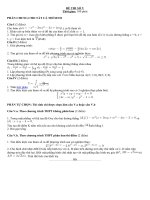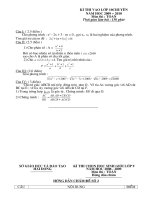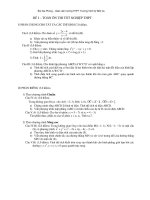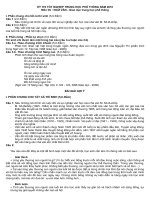ĐỀ THI THỬ VÀ ĐÁP ÁN TỐT NGHIỆP THPT 2011 MÔN: ANH VĂN – ĐỀ 4 pps
Bạn đang xem bản rút gọn của tài liệu. Xem và tải ngay bản đầy đủ của tài liệu tại đây (60.65 KB, 4 trang )
ĐỀ THI THỬ VÀ ĐÁP ÁN TỐT NGHIỆP THPT 2011
MÔN: ANH VĂN – ĐỀ 4
1.a. study b. reply c. apply d. rely
a. teacher b. money b. return d. ruler
2.a. churches b. chairman c. chemist d. changer
3.a. heat b. seat c. great d. meat
4.Gold, as well as silver, in price. a. have risen b. has risen
c. rise d. are rising
5.He to New York three times this year. a. had been b. was c. is
d. has been
6.I remember you about this beforen a. tell b. to tell
c. telling d. told
7.Each of you a share in the work. a. have b. has c. having
d. to have
8.He let the letter onto the floor. a. fall b. falls c. falling
d. fell
9. all my warnings, he tried to fix the computer himself.
a. instead of b. in spite of c. although d. because
10. Your homework finished last night? a. was b. did c. are
d. do
11.Have you decided to apply the job yet? a. for b. to c. into
d. off
12.Mr. Brown has many patients he is always busy.
a. too/ that b. very/ until c. such/ that d. so/ that
13.We are very fond_______ folk music. a. in b. at c. with
d. of
14.The children parents work late, are taken home by bus. a. that b.
whom c. whose d. their
15.He wanted to know the reason I was late a. as b. for c.
why d. because
16.She doesn’t understand I am saying. a. what b. that c.
whose d. where
17.We have to start early we won’t be late. a. so that b. that
c. because d. because of
18.The place we spent our holiday was really beautiful. a. what
b. who c. where b. which
19.She goes a lot. She hardly ever spends an evening at home. a. out
b. down c. along d. over
20.There are small between British and American English.
a. differences b. different c. difference d.
differently
21.Some species of rare animals are in of extinction.
a. danger b. dangerous c. dangerously d. endanger
22.We are of the long journey. a. tire b. tiring c. tired
d. to tire
23.Sara speaks so that I can’t understand her. a. fast b. fastly
c. faster d. fastesr
24.Would you mind me a hand with this bag? a. give b.
giving c. to give d. to giving
25.When I came in, everyone were watching a film.
A B C D
26.My family spent an interested holiday in Europe last summer.
A B C D
27.My uncle lived in Hanoi since 1990 to 1998, but he is now living in Hue.
A B C D
28.He stopped to smoke because it is harmful for his health.
A B C D
29.I didn’t have an umbrella with me, so I got wet.
a. If I had had an umbrella, I wouldn’t get wet c.If I had had an
umbrella, I would get wet
b. If I had had an umbrella, I wouldn’t have got wet d. If I had had an
umbrella, I would have got wet
30.Peter wanted to win the race. He ran .
a. So fast as he can. b.fast as he could c.fast as he can.
d.as fast as he could
31. The coffee was too hot for me to drink
a. The coffee is so hot that I can’t drink it b.The coffee is so
hot that I can’t drink
c. The coffee was so hot that I couldn’t drink d.The coffee was
so hot that I couldn’t drink it
32. Learning English is not easy a. It is not easy to learning English
b.It is easy learning English
c. It is not easy to learn English d. It is not difficult
to learn English
1/ Approximately 350 million people … (33)… English as their
first… (34)… About the same number use it … (35)…. A second language.
It is a language … (36)…. Aviation, international sport and world
trade.75% of the world’s….(37)… is in English,60% of the world’s radio
stations ……(38)…. In English, more than half of the world’s newspapers
are ….(39)… in English. It is an official language in 44 countries. In
… (40)… others. It is a language of the business, commerce and
technology. There are many … (41)… of English, but Scottish, Australian,
Indian and Jamaican speakers of English, in spite of the differences in
pronunciation, structure and vocabulary, would .(42)… that they are all
speaking the same basic language.
33 A. say B. speak C. tell D. talk
34 A. language B. languages C. linguistics D. linguist
35 A. of B. with C. as D. in
36 A. on B. to C. from D. of
37 A. mail B. parcels C. envelopes D. letters
38 A. broadcast B. travel C. write D. show
39 A. spoken B. printed C. sold D. taken
40 A. an B. more C. many D. much
41 A. varieties B. kind C. type D. sort
42 A. use B. keep C. invent D. recognize
2/ I was born in Newcastle, a city in the North East of England. Newcastle is
on the bank of the River Tyne. It is quite big, with a population of about
200000 people. There is a cathedral and a university. There are five bridges
over the River Tyne, which link Newcastle to the next town, Gateshead,
where there is on of the biggest shopping centres in the world. A few day
ago, the main industries are shipbuilding and coalmining, but now the
chemical and soap industries are important. I moved to London ten year ago
but I often return to Newcastle. I miss the people , who are very friendly,
and I miss the beautiful countryside near the city, where there are so many
hills and streams
43.Newcastle is . a. city near the north east of England.
b. A small town in England
c.A city in the north east of England d. A city the north
of England
44.The population of Newcastle .
a. 200,000 people b. Much less than 200,000 people c.Much
more than 200,000 people d. About 200,000 people
45.Gateshead has one of in the world.
a. The largest rivers c.The most important
shipbuilding industries
b. The most beautiful countrysides d. The biggest
shopping centres.
46.According to the passage, the writer .
a. Is still living in Newcastle c.Has never
returned to Newcastle
b. Doesn’t live in Newcastle any more d. Has come back
to live in Newcastle.
47.Which of the following is NOT true about Newcastle.
a. Its people are friendly. c.Its main industry
now is shipbuilding
b. It has a cathedral and a university d. It is next to
Gateshead.
48. Susan is looking for something . a. eat b. to eating b. to
eat d. eating
49.We need more sugar. There is sugar in the spot. a. much
b. many b. any d. little
50………….is Oxford from Cambridge? a. How long b. How far b.
How long away d. How often









